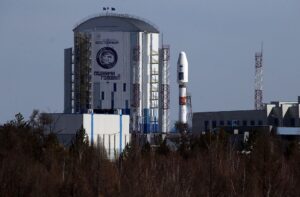With last year’s successful US Artemis 1 mission to the moon and back, and with India’s successful launch of its lunar lander Chandrayaan-3 on July 14, Russia’s President Vladimir Putin apparently is feeling left out. So, Roscosmos, the Russian space agency, announced a lunar mission for Aug. 11, launching at Vostochny Cosmodrome in the easternmost region of Russia in Siberia near the border with China. The moon lander, named Luna-25, will be put into a lunar trajectory by the Russian mainstay rocket, the Soyuz-2.1b Fregat.
The Luna-25 weighs approximately 3,850 pounds fully fueled and with scientific equipment and solar panels onboard. Once launched, Luna-25 will ride the Fregat into a “lunar transfer orbit, and from the lunar orbit it will drop down to the surface,” according to a NASA narrative. The landing site for the craft is at the southern pole of the moon, where it will carry out experiments to analyze the composition of the polar regolith (dust and other matter covering rocks) and determine if ice or valuable minerals might be present.
Is Russia’s Moon Mission a Competition?
Coincidentally, India’s mission will transition from a lunar orbit to landing while Luna-25 is making its way to the surface. “The Russian Space Agency stated, ‘There is no danger that they interfere with each other or collide. There is enough space for everyone on the Moon,’” Reuters reported. “Chandrayaan-3 is due to run experiments for two weeks, while Luna-25 will work on the moon for a year.”
Nonetheless, both spacecraft are scheduled to touch down at the lunar south pole on Aug. 23. Though Chandrayaan-3 has been on its journey for a few weeks, the Indian space mission involves numerous maneuvers and lunar orbit insertions as positioning experiments. Once in a landing orbit, “The landing module, comprising the Vikram lander and Pragyan rover, will separate from its propulsion system as the spacecraft gets even closer to the Moon,” Hindustan Times reported.
Meanwhile, if the Russian moon mission is launched on schedule, it will not be without its troubles. When Putin began his unprovoked invasion of Ukraine, the European Space Agency (ESA), a longtime collaborator with Roscosmos, severed its association. “ESA will discontinue cooperative activities with Russia on Luna-25, -26 and -27. As with ExoMars, the Russian aggression against Ukraine and the resulting sanctions put in place represent a fundamental change of circumstances and make it impossible for ESA to implement the planned lunar cooperation,” the agency announced in April 2022. That meant Russia was on its own readying the Soyuz-2 rocket and landing module.
Russia’s Moon Mission Is Complicated

Vostochny Cosmodrome (Photo by Mikhail Svetlov/Getty Images)
To further complicate matters, the Vostochny Cosmodrome is close to a Russian village in the Soyuz-2’s launch path. “’Residents of a village in Russia’s far east will be evacuated from their homes at 7.30 a.m. on Friday (Aug. 11) because of a ‘one in a million chance’ that one of the rocket stages that launches Luna-25 could fall to earth there,’” Reuters also reported. The original date for Russia’s moon mission was October 2021, nearly two years ago, so there have been numerous delays.
Why is the moon excursion a priority for Putin now, considering his stalled Ukraine invasion and Kyiv’s slowly progressing counteroffensive?
It could well be about Putin’s pride and hubris. During a visit to the Vostochny launch pad last year, Russia’s president boasted that “the Soviet Union had achieved the first man into space in 1961 despite ‘total’ sanctions. He insisted Moscow would develop its lunar program despite current Western sanctions,” Barron’s explained. “’We are guided by the ambition of our ancestors to move forward, despite any difficulties and any attempts to prevent us in this movement from the outside,’ Putin said at the time.”
Despite the bravado, Putin must realize Russia is hemorrhaging resources at an enormous rate. Touting the Kremlin’s accomplishments with its space program may play well in the neighborhoods of Moscow, but the bill will come due. Will the citizens of the Motherland be willing to pay Putin’s invoices? Meanwhile, the United States is well on its way to robust manned moon-and-beyond exploration adventures.
All opinions expressed are those of the author and do not necessarily represent those of Liberty Nation.
Do you have an opinion about this article? We’d love to hear it! If you send your comments to [email protected], we might even publish your edited remarks in our new feature, LN Readers Speak Out. Remember to include the title of the article along with your name, city, and state.
Please respect our republishing guidelines. Republication permission does not equal site endorsement. Click here

